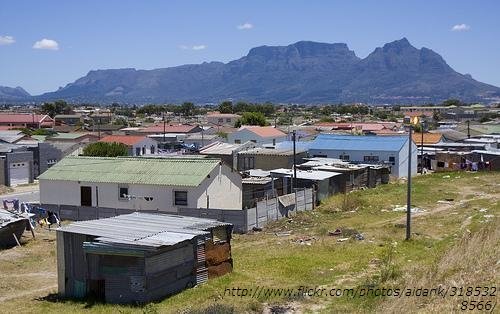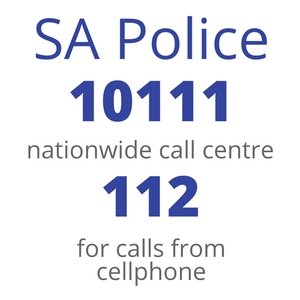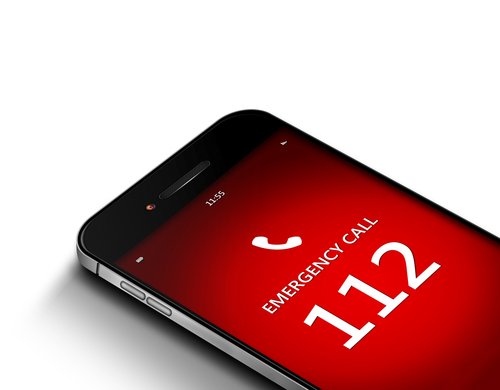Crime in South Africa
How safe is living in Cape Town?
The high rate of crime in South Africa is a major concern for tourists as it is for expatriates moving to or living in Cape Town.
On this page you will find information on the latest South African crime statistics published in October 2017 and the latest Victim of Crime surveys from September 2017. Further we will share some insights and safety tips below.
Crime in South Africa: South Africa is known to have one of the crime rates in the world regarding assault, rape and murder. Johannesburg, Pretoria, Cape Town and Durban are ranked usually as critical crime threat locations. With terror alerts, xenophobic outbreaks and violent protest actions as well as pre-planned or opportunity crime along the cities' major highways, many expats and foreigners are wondering about the crime situation and their safety in South Africa. Here we will share our insights.
 Cape Town Townships - Hotspots for Crime in South Africa
Cape Town Townships - Hotspots for Crime in South AfricaThe recurring news flashes about public unrest in Hout Bay and the Helderberg area as well as the shocking reports about the many rape and murder incidents are unsettling and intimidating. When moving to South Africa, we highly recommend to investigate which area to move to, where to live and which places to avoid, so you can minimise the risk of becoming a victim of crime. Also make sure, that you get in-depth information about an area unknown to you, check the various Facebook forums or contact the local police station for advice, if you are not certain that the area you plan to visit, work in or travel through is safe.
Crime and violence affect everybody like everywhere else in the world. In South Africa, most crimes reported happens in poorer areas, but also the residents in more affluent suburbs are affected by violence and crime. In the city center, know which parts to best avoid, especially after dark. However, this advice would certainly apply to metropolitan cities worldwide. However, especially in the local townships, there are certain areas which are absolute no-go areas, which even in emergencies can only be accessed with protection and also most other parts which are best avoided, if you are not accompanied by a local guide and are introduced to the area.
To help you get a better overview of the situation of crime in South Africa, we decided to have a look again at the latest South African crime statistics as reported on 24 October 2017 and give you some insights.
The latest South Africa Crime Statistics | Crime in South Africa
The main figures given in the latest South African Crime Statistics in comparison to the statistics of the last year state are stated below.
According to the 2016/2017 crime statistics, all community reported crime in South Africa has decreased:
- Contact crimes decreased by 2.4%
- Contact-related crimes decreased by 3.3.%. Among the contact-related crimes are arson and malicious injury.
- Property related crimes, including burglary and theft from promises and vehicles, decreased by 0.5%. In the Western Cape a decrease of 6.1% was recorded, while in Gauteng an increase of 2.5% is stated.
However, one must note: Only reported crime is taken into the official data, the real crime in South Africa figures are estimated to be higher, as for example rape victims often do not report this serious offence in fear of reprisals. Further burglary and animal stock theft is not always reported to the police.
However it is to note that some subcategories show significant increases - often also dependent on the various provinces. We will give here some detail:
Crime in South Africa - Increases
- The two contact crimes: murder and attempted murder, increased by 1.8% and 0.4% respectively. The Western Cape alone shows 3311 cases for the year and an increase in 2.7%. Gauteng and Mpumalanga also show significant increases and both state over 4000 murder cases.
- While there are less rape cases, the sexual-assault category shows increased figures: 5.2% for Gauteng and 6.0% for the Western Cape.
- Carjackings increased 14.5%. The highest increase of car jackings are recorded in these provinces: Mpumalanga (+28.7%), KwaZulu-Natal (+21.5%), Gauteng (+16.9%) and Western Cape (+8.3%)
- Aggravated robbery increased significantly by 6.4%.
- Robbery aggravating increases significantly: carjacking 14.5% (see above), robbery at residential premises by 7.3%, robbery at non-residential premises increased by 5.0%.
- While property-related crimes decreased, it has been noted that in Gauteng the theft of vehicles and the theft out of and from vehicles has significantly increased by 3.9% and 7.5% respectively.
- Robbery of cash in transit increased by 10.9%
- Commercial crime increased by 5.2%
Crime in South Africa - Cape Town Crime Statistics Findings
- Offences such as street muggings, smash-and-grab-robberies and pick-pocketing are a common occurrence in many cities around the world and you are advised to stick to common-sense safety measures. However, here often knifes or handguns are involved with street crime.
- Serious crimes are experienced mainly in low-income areas and townships. The highest violence, assault and property crime rate is experienced in the Cape Flats, where gang-violence is claiming many lives. Further, areas such as Nyanga, Mfuleni, Khayelitsha or Gugulethu remain the most dangerous places according to murder and serious crime statistics of the last years.
- Burglary, robbery and theft of private property are among the most reported crimes.
- Many neighbourhoods have put on special awareness campaigns and stepped up security with private watches and have now a much more visible police presence. Crimewatch members patrol the streets day and night and so have cut down on criminal offences in some areas drastically.
- For car-jacking, theft of private property and robbery, the middle class and more well-heeled population are especially targeted.
- Be alert as ID theft is increasingly happening. Make sure to dispose of your personal details on letters/envelopes etc in a safe manner. And always keep your eyes on your credit card when paying at a shop, petrol station or in a restaurant. Check your surroundings when using any ATM and report suspected ID theft immediately.
Victim of Crimes Survey by Statistics South Africa
The Victim of Crimes Survey is a countrywide household based survey undertaken by StatisticsSA to explore the perceptions of the public in regards to crime prevention and activities dealing with crime and victimisation. Data is collected in form of face-to-face interviews at randomly chosen homes. The accuracy is limited to the actual answers by the victims and their ability to recall past victimisation events. The data is thus collected completely differently to the police statistics which only give a picture about reported crimes and incidents.
Here are some interesting findings from the 2017 survey:
- The most common crimes experienced by the participants were housebreaking/burglary (53%), theft of livestock (11%) and home robbery (10%).
- 84% of all respondents reported to feel safe in their neighbourhood during the day, while only 30% felt safe walking at night.
- Feelings of safety continued to deteriorate over the years, especially when after dark. Participants stated that they had invested in more security measures around the home (51%) and in vehicles (41%)
- 'The study highlighted that households’ confidence in police services and courts has been gradually eroding over the years. Households that held negative attitudes about the police felt that the police could not recover stolen goods (59%), whereas those that were disgruntled with court services said that courts were too lenient towards criminals.'
- Electronic equipment such as laptops, TVs and cellphones were the most stolen items during a housebreaking. It is critical to note that only 51% of all victims of housebreaking reported the incident to the police!
- People most affected by theft of personal property are people in their late twenties and early thirties.
- 'Victims of hijacking are older than victims of theft of personal property. Victims of hijacking on the average are in their late thirties and forties.' as stated in the report.
- The vast majority of victims of assault were between 20 years and 30 years of age.
- People living in Gauteng (18.5%) and in the Western Cape (17.5%) responded that they increasingly use private security for additional protection.
- Over 44% of the interviewed persons believed that crime was mostly motivated by drug related needs and not by real needs.
Further these points were not elaborated in the most recent crime statistics, but were mentioned in the 2015 crime statistics and we trust the answers still reveal relevant insights, so we add these here as well:
- Almost half of the victims of sexual offences in 2015 knew the perpetrator. The perpetrators were mainly either member of the community 34.2%, a lover or spouse 16.8% or a relative 9.2%.
- Assault and sexual offences are believed to be highly underreported as the majority of victims of these crimes reported they were also victimised by their relatives, a known community member, spouses and lovers.
- More than 70% of the interviewed in 2015 believed that corruption had increased during the previous three years (This question was not asked anymore in 2017 though!)
- Theft from cars, car theft and housebreaking happened mostly at night.
Crime in South Africa: Carjackings
Increasingly, carjackings are an occurence in all provinces. 16,717 carjackings were reported in the Crime Statistics 2017 (compared to 11,000 carjackings reported in 2015!). The provinces with the most occurrences of the nine provinces are Gauteng, KwaZulu-Natal, the Western Cape and Mpumalanga.
Read more about carjackings and prevention tips
Be informed about Crime: Safety Advice
In regards to more recent burglaries at shopping malls and various stores selling goods of high value, the only advice is too be vigilant who is in and around the shops or in the malls. It is a scary thought to get involved in a crime situation, but unfortunately only good security can prevent this - as everywhere in the world - and shopkeepers and staff at malls are called to take their task more seriously and employ better preventative measures as well. Read through the 'Be Alert!' Advice by the South African Police Service (SAPS) to stay safe here
It is highly recommended, to take some basic safety precautions, when moving to and living in South Africa. There are simple precautions which you should take for not becoming a victim of crime in South Africa.
Read our safety tips for Cape Town
Recommended Reading on Crime in South Africa
- Find the 2016/2017 statistics here
- Find the 2014/2015 statistics here
- The Victim of Crimes Survey offers good insights into the perception of crime and the statistical data. You will find the latest VOC survey 2016/7 here.
Remember to keep informed to stay safe!






